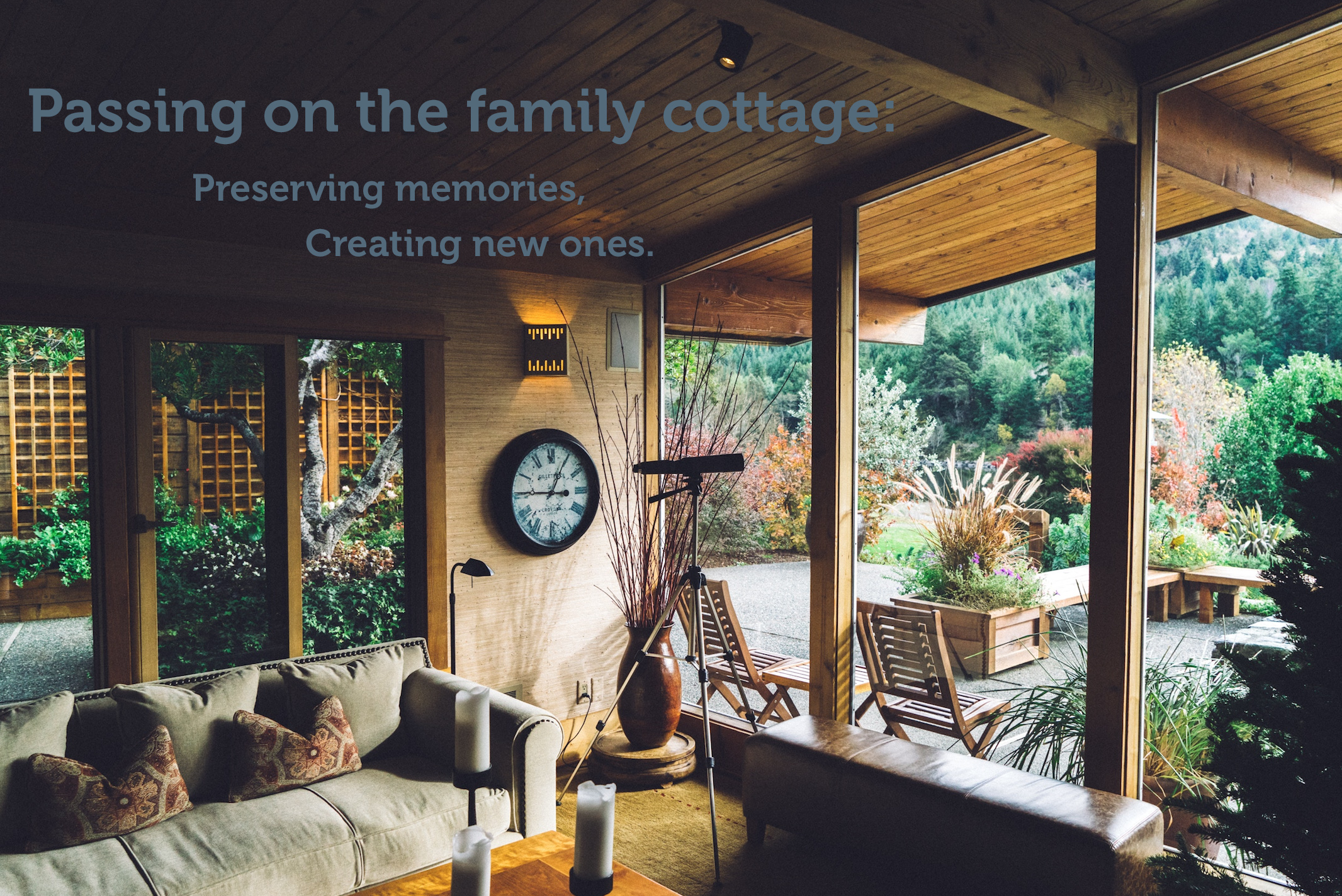[tweet_box design=”box_03″]Your cottage is the backdrop of cherished family memories. [/tweet_box]
For countless Canadians, the cottage has a special place in our heart. It’s the patter of little feet and the joyous splash of our kids running along the dock and plunging into the lake. It’s the cozy afternoon of hot chocolate and playing cards, while the thunderstorm howls outside. It’s the togetherness of family sharing stories around the dancing flames of a campfire.
Many of us assume that our cottage will stay in the family, passed on through the generations. But have you considered how this will happen from a practical and legal perspective? If you have multiple children, will they share ownership or will only one inherit the cottage? Have you thought about who will pay the capital gains tax – potentially in the tens of thousands of dollars – that may arise with the transfer of ownership when you die, and where this money will come from?
Your cottage is the backdrop of cherished family memories. However, without planning to pre-empt potential family disputes and unexpected tax burdens when ownership passes to the next generation, there is no guarantee that your children and grandchildren will be able to continue building these memories.
No tax holiday for your holiday home
When you die, your cottage is treated the same as your other assets: from a tax perspective, Canada Revenue Agency will assume it has been sold at fair market value and – assuming this value is higher than price you paid for the cottage – apply capital gains tax to half of the increase in value.
In this situation, numbers are better than words for illustrating the point: if you purchased your cottage years ago for $225,000 and it is worth $500,000 when you die, your estate could be hit with a capital gains tax bill of $61,875[1].
Will your children have that kind of cash on hand to pay the tax owing? Will they have to take out a loan to cover this amount? Or will they be forced to sell the cottage?
[1] This assumes a marginal tax rate of 45%, applied to half the increase ($137,500) in the value of your cottage.
These questions can be difficult to answer, especially when you don’t know what the future holds for you or your children. Fortunately, there are different strategies that can help you minimize the uncertainty and reduce the risk of your family losing the cottage, including the following:
- Establish a family trust. By transferring ownership of your cottage to a family trust, you or an appointed trustee can exercise greater control over the ownership, maintenance and use of the cottage. Your children and other family members will be able to enjoy the benefits of having the cottage, but will be spared some of the financial implications of direct ownership.
- Use a life insurance policy to cover any tax obligations. This can be a cost-effective way to cover the capital gains tax for your cottage. By using the death benefit from the life insurance to pay the tax bill, your children will not need to come up with tens of thousands of dollars on their own.
[tweet_box design=”box_03″]Making sure to establish a #familytrust and using a #lifeinsurancepolicy to cover tax obligations will help to minimize the risk of your family losing your cottage. #RubachWealth [/tweet_box]
Hoping the kids will play nicely
Most of your family memories of cottage life are undoubtedly positive, but chances are there were some sibling arguments mixed in among all the sunny days. As grownups, your children will be better at resolving disagreements without wrestling, but that still doesn’t mean they will see eye to eye on everything.
If you have more than one child and want to leave the cottage to all of them, the best place to start is with an open and honest family discussion. This is an opportunity for both you and your children to share your wishes, intentions and expectations.
Even if everyone is on the same page now, it’s important to acknowledge that this may change as personal, financial and health situations evolve in the years ahead, resulting in differing views on usage and ownership. A buy/sell agreement is a useful tool for managing changing circumstances in the future.
Such an agreement lays out clear rules for what happens if one or more of the children want to sell their share of the cottage. By providing clarity, a buy/sell agreement can help prevent your family’s cottage memories from being overshadowed by tears and animosity.
Sunny outcomes require a plan
Ultimately, there are many factors to consider when passing along a cottage to the next generation and many ways to tackle this issue, but doing nothing is not one of them. Failing to plan ahead can result in hurt feelings and financial hardship among your family members after you die.
At Rubach Wealth, we can work with you to understand your priorities and develop tax-optimized strategies aligned with your wishes. If you have a cottage that you hope to keep within your family for future generations, call us today to set up a meeting. Your family has been shaped by the magic of sunsets at the lake, and we want to ensure that your children and grandkids can enjoy sparkling sunrises on the dock for decades to come.
[tweet_box design=”box_03″]#RubachWealth can help you develop tax-optimized strategies that align with your #wishes and #priorities [/tweet_box]
Disclaimer: This article is provided for informational purposes only and does not constitute any form of legal or tax advice. You should consult your lawyer and/or accountant prior to making decisions related to the topics covered in this article. Rubach Wealth can work with you to facilitate such discussions.




